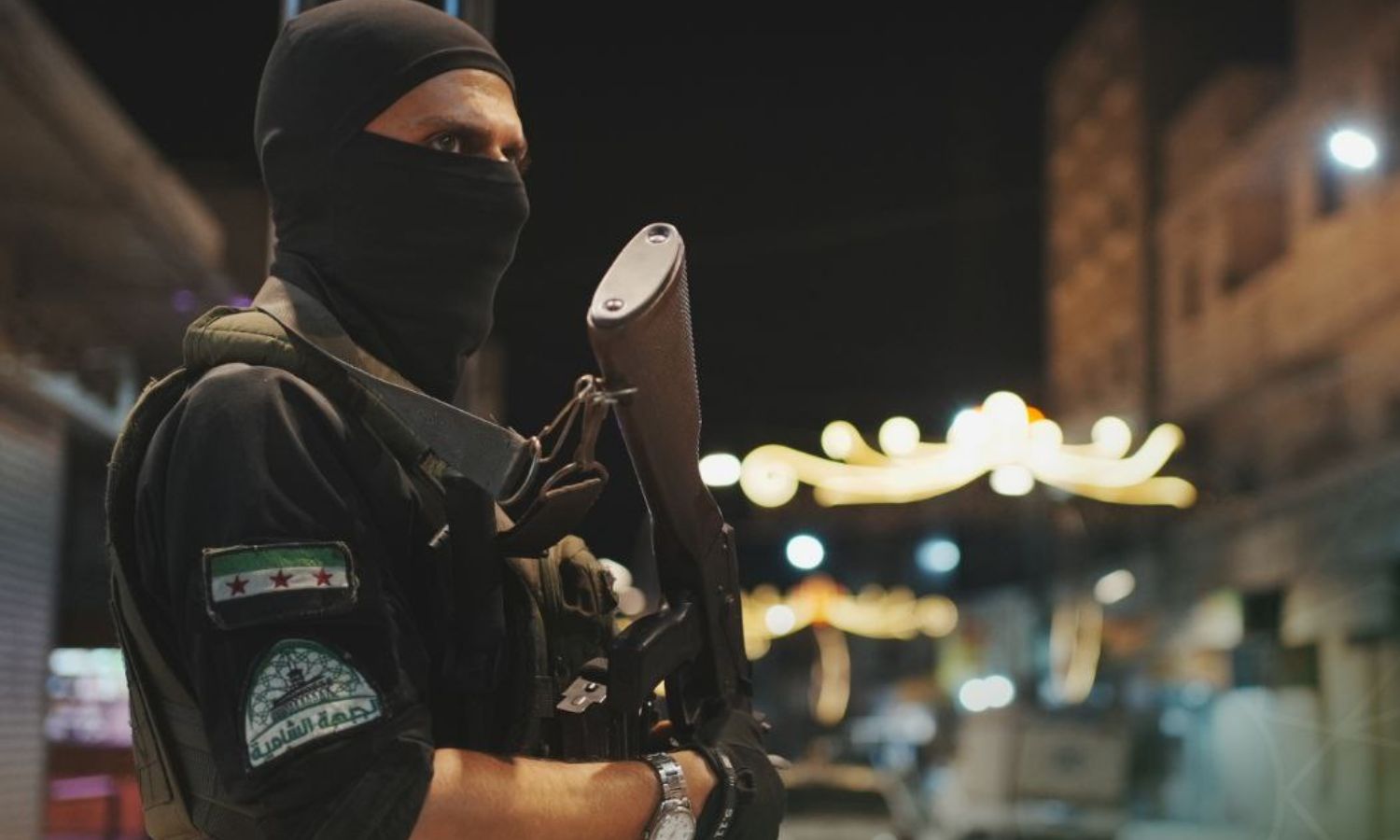



A statement published by the Shamiya Front, one of the factions of the Turkish-backed Syrian National Army (SNA), publicly revealed the disputes between it and the head of the Syrian Interim Government (SIG), Abdulrahman Mustafa, after these disagreements had previously been exchanged by activists on social media platforms.
On Wednesday, September 4, the Shamiya Front announced in a statement that it was suspending its work with the Interim Government, the executive arm of the Syrian National Coalition led by Abdulrahman Mustafa.
In its statement, the Shamiya Front accused the head of the Interim Government of inciting against “revolutionary entities,” including the Ahrar al-Sharqiya and the Shamiya Front factions, fabricating political and criminal charges, and tarnishing its image in front of Turkish politicians “for personal interests.”
The statement indicated that the reason for Mustafa’s “hostility” was the Shamiya Front’s proposal for a work plan “in response to the people’s demands for reform and change.”
The Shamiya Front called on the Coalition to withdraw legitimacy from Mustafa and refer him to the judiciary.
Malik al-Ahmad, director of the media office for the Shamiya Front, told Enab Baladi that the vote of no-confidence in Mustafa’s government was a natural response to the “deteriorating” situation in the region due to government policies.
Al-Ahmad added, “We hope to form a technocratic government that meets the aspirations of the Syrian people in the region.”
Al-Ahmad told Enab Baladi that the Shamiya Front had contacted the Coalition after the latest disagreement seeking legal ways to change the government, and described the Coalition’s handling of the issue as “positive.”
There has been no comment from the Syrian National Coalition and the Interim Government, which follows the Coalition, on their official platforms.
Yahya Maktabi, a member of the General Assembly of the Syrian Coalition, told Enab Baladi that efforts were underway to address the issue, without mentioning details.
Meanwhile, Enab Baladi reached out to officials in the Interim Government, including its head and four members of the Syrian Coalition for comments on the Shamiya Front’s statement, but received no response until the time of editing this report.
Other figures declined to comment due to the “sensitivity of the topic,” as they expressed.
These disputes developed after a meeting sponsored by Turkey last Tuesday.
A statement published by the Interim Government mentioned that a meeting included figures from the Coalition, the Interim Government, leaders of the Syrian National Army, and representatives of tribal components.
According to the statement, the meeting discussed the Syrian situation in areas controlled by the National Army and the challenges in the region.
The statement emphasized the importance of the Abu al-Zandeen crossing as a vital, economic, and humanitarian outlet with a “positive impact” on the region’s residents.
The statement denied that the crossing is related to the normalization files between Turkey and the Syrian regime, which have been discussed in recent months.
The Abu al-Zandeen crossing north of al-Bab is a gateway connecting areas controlled by the Syrian National Army with regime-held areas. It has been closed since 2020 and was later used as an exchange point for prisoners between the regime and the opposition.
The crossing is managed on the opposition side by the military police affiliated with the Syrian National Army after it was previously controlled by opposition factions that fought for control over the crossings due to their economic significance.
The name Abu al-Zandeen has been associated with normalization files between Turkey and the Syrian regime, with talks about reopening it under a Russian-Turkish agreement, as part of the normalization track between Turkey and the Syrian regime which Russia is pursuing.
The Interim Government attempted in mid-August to reopen Abu al-Zandeen, which was met with rejection by residents of the region and fighters within the National Army, who then headed to the crossing and prevented trucks from passing through.
This was not the only attempt to reopen the crossing, as the Interim Government tried multiple times to reopen it but faced resistance from local components supported by fighters from the National Army, despite the support of National Army leaders for its opening.
The Shamiya Front statement noted that the head of the Interim Government, Abdulrahman Mustafa, attacked the ongoing movement against his government, describing it as a “sabotage and coup conspiracy against his government.”
At the beginning of last July, a number of activists and academics announced the Dignity Sit-in movement.
This movement resulted in demonstrations protesting the opening of crossings with the regime and condemning the position of the Interim Government on Turkish politicians’ statements regarding the resumption of relations between Turkey and the Syrian regime.
In mid-July, protesters closed the headquarters of the Interim Government and the National Coalition in the city of Azaz, northwestern Syria, considering the buildings to be the property of the people and that the Coalition and Interim Government do not represent the people.
Meanwhile, the Interim Government warned at the time of “separatist and suspicious projects seeking to destroy the achievements of the revolution.”
A statement published by the Interim Government mentioned that it would take legal measures against any “sabotage” act and present it to the judiciary.
The Syrian National Army controls the city of Azaz, and the Shamiya Front is one of the prominent factions in the city, using it as a main headquarters.
The Shamiya Front, which was established in 2015, is one of the components of the Third Division within the Syrian National Army and considers itself an extension of the Tawhid Brigade, one of the first factions of the Free Syrian Army formed since the beginning of the Syrian revolution.
if you think the article contain wrong information or you have additional details Send Correction